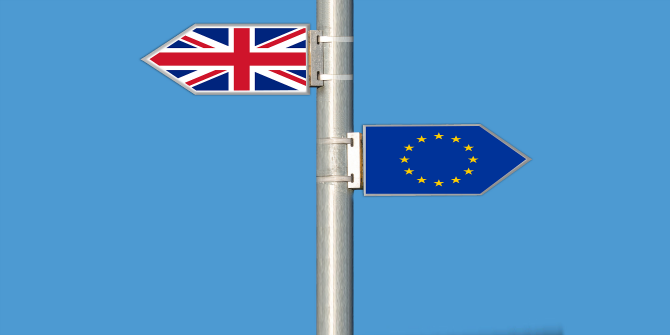 Public discussions about how the UK is to exit from the European Union have been too simplified, and have failed to come up with any solution that recognizes that only England and Wales in fact voted to leave. Brendan O’Leary outlines a way forward where those nations wanting to remain in the EU might be able to do so.
Public discussions about how the UK is to exit from the European Union have been too simplified, and have failed to come up with any solution that recognizes that only England and Wales in fact voted to leave. Brendan O’Leary outlines a way forward where those nations wanting to remain in the EU might be able to do so.
There has as yet been no Brexit, and there will not be – because there is no such entity as ‘Britain’. There could, however, be a UKexit. But those who insist that a 52-48 vote is good enough to take the entire UK out of the EU would trigger a serious crisis of legitimacy.
England and Wales have voted to leave the European Union, but Scotland, Northern Ireland, and Gibraltar have voted to remain. These differing outcomes have to be the central focus of political attention while we wait for the debris of broken expectations to settle.
First things first: saving the UK
But there is a constitutional compromise that would avoid the genuine prospect that a referendum on Scottish independence – promoted by the SNP and the Green Party – will lead to the break-up of the union of Great Britain. The Scots have every right to hold such a referendum, because the terms specified in the SNP’s election manifesto have been met: a major material change in circumstances has occurred.
The same constitutional compromise could diminish turbulence spilling into Northern Ireland. The same day that Nicola Sturgeon publicly indicated preparations for a second Scottish referendum, the Deputy First Minister of Northern Ireland, Martin McGuinness (Sinn Féin), demanded that a poll be held to enable Irish reunification.
Sinn Féin has a point. Many in Northern Ireland fear that a UK-wide exit would restore a border across Ireland, and strip away core components of the 1998 Good Friday Agreement. Does the narrow outcome of a UK-wide referendum automatically over-ride the terms of the Ireland-wide referendums of 1998, and a majority within Northern Ireland? It would be perfectly proper to call for a border poll to give people the option of remaining within the EU through Irish re-unification – especially if there is no alternative that respects the clear local majority preference to remain within the EU. The very same compromise may also weaken the pressure from the Spanish government for the UK to cede sovereignty over Gibraltar.
External Association: England and Wales out, Scotland and NI in
The compromise would be that the bulk of the United Kingdom would be outside -‘externally associated’ perhaps – and some of it inside the EU. This change would reflect the fact that the UK is composed of two unions – that of Great Britain, and that of Great Britain and Northern Ireland – and that in each of the two unions one partner has clearly expressed the desire to remain within the EU. All four mandates within the UK would be respected in what was an advisory referendum.
Is this feasible? Recall first that many UK dependencies – including three members of the British-Irish Council, Jersey, Guernsey and the Isle of Man – are currently not part of the EU. So it’s already the case that sovereign states, including the UK, have parts of their territories within the EU, and parts of them outside. The terms of the foundational treaty, the Treaty of Rome, also envisioned associate status: they were designed for the UK.
Then consider past precedent. Greenland, part of Denmark, seceded from the EEC, but Denmark remained within the EEC. That, of course, had few consequences for power within the EU given Greenland’s small population, and the components of the UK that remain within the EU would not be entitled to the same rights that currently are held by the UK as a whole.
Negotiating a UK-wide exit is not going to be easy for the next Prime Minister and Cabinet. Indeed, the difficulties may precipitate a re-alignment of party politics and a general election. Westminster must also give effect to the advisory referendum, and it will have to deliberate over the consequences of imposing an EU departure against the majority will of Scotland and Northern Ireland.
The consensual solution would be to negotiate for the secession of England and Wales from the EU, but to allow Scotland and Northern Ireland to remain – with MEPs, but without representation on the Council of Ministers, though with the right to have a single shared commissioner.
To work, this compromise requires part of the UK to remain within the EU and for those to require representation inside the EU’s institutions. Retaining MEPs in Scotland and Northern Ireland would be easy. They would be numbered as proportional to population and this would have no major implications for the big states.
But London ministers could not retain power in the Council of Ministers if the bulk of the UK is outside the EU. I suggest that the now vacated UK Commissioner’s role could be kept, but the appointment could be rotated between Scotland and Northern Ireland, in a 3:1 ratio over time, reflecting Scotland’s greater population. The Commissioner would be nominated by the relevant government and appointed by the UK government. (A judge to serve in the European Court of Justice could be nominated in the same way.) The retention of one Commissioner and their MEPs would give Scotland and Northern Ireland a say in agenda-setting and law-making. And it would remove any UK ministerial veto over EU decision-making.
The future role of Westminster would be to process EU law that applies to Northern Ireland and Scotland – strictly as an input-output machine – thereby ensuring that Scotland and Northern Ireland have the same EU law, and that the Union is retained. It would be up to Westminster to decide which components of EU law will apply to England and Wales – a convenience that may be helpful in dealing with the repercussions of what has just occurred.
The currency is a reserved Crown power, and the proposed compromise would not lock Scotland and Northern Ireland into the Eurozone. Rather as part of the UK, Scotland and Northern Ireland should inherit the entire UK’s position under the Maastricht treaty (stay with sterling unless the UK let them adopt the Euro).
The benefits and difficulties of this compromise
All of Ireland, Scotland, England and Wales would be an internal passport free-zone. However, one negative consequence of this compromise would be a hard customs border in the Irish Sea. But that would be better than one across the land-mass of Ireland.
Another effect would be a hard customs border between Scotland and England. If all of Ireland and Scotland remain in the EU there cannot be a single market in the UK, as defined by the EU, and therefore a customs barrier will have to exist. But a hard customs border will materialize in any case if a Scottish referendum led to independence.
Ireland, North and South, and Scotland could not join the Schengen agreement because that would mean that England and Wales would lose the control over immigration which was emphasized by the leave side in the referendum. But then, they are not part of Schengen at present, and there is no evidence that a majority in any of the three countries wants to be.
Would there be any other benefits to this idea, aside from keeping the UK together? UK enterprises could re-locate to EU zones within the UK, which would soften the negative consequences of an entire UK exit. These arrangements would leave England and Wales to experiment with whatever policy freedoms they preferred.
Citizenship and migration-law would have to be reconsidered, but the ensuing difficulties could be negotiated. These matters will be on the table anyway.
Other nations and states matter
Going forward, the collective ingratitude and contradictions of nations and states should never be underestimated. Consider, for instance, the vote in Wales, which has been undeniably a net beneficiary of the EU, while its devolved leadership has already said that it will want to renegotiate the Barnett formula.
Some constitutional reconstruction of the UK is therefore necessary. The starting question to be posed to Conservative and Labour leaders, and to the UK Parliament, is whether the Welsh and the English believe that the first cost of taking back control of their own affairs should be the imposition of control over Scotland and Northern Ireland.
The interests of states in making bargains and treaties are rarely based on profound generosity. The divorce agreement that the Leave side will seek to negotiate has to be acceptable to the existing member-states of the EU, or else there will be a chaotic UK departure without agreement.
And so the new Cabinet that will negotiate with its European counterparts will soon realize that the Irish and Spanish states have a veto power over the divorce agreement – and any subsequent ones. Spain and Ireland are not alone. There will be many states with an interest in protecting their stranded ‘diasporas’, not just the flow of capital, goods and services.
And don’t forget about the United States. Anyone who imagines that a UK-US trade agreement will get easily get through the American Senate has limited knowledge of US treaty-making. It will not matter whether Clinton or Trump is in the White House: as Obama has warned, the UK will be “in the back of the queue”. The constitutional compromise suggested here will calm the UK’s domestic politics, and give the EU a continuing stake in some of the UK.
There is one key lesson from the political science of multi-national states. They are usually not destroyed by secessionists alone. Rather, the key trigger that leads to the break-up of such states is the unilateral adjustment of the terms of the union by the centre, without the consent of its multi-national components.
____
 Brendan O’Leary is Lauder Professor of Political Science at the University of Pennsylvania. He was formerly Professor of Government at LSE, where he also did his PhD. Professor O’Leary is International Fellow at the Senator Mitchell Institute at the Queen’s University Belfast, a Member of the US Council on Foreign Relations, and former Senior Advisor on Power-Sharing in the Standby Team of the United Nation’s Mediation Support Unit. He advised governments and parties in Northern Ireland during the making of the Good Friday Agreement.
Brendan O’Leary is Lauder Professor of Political Science at the University of Pennsylvania. He was formerly Professor of Government at LSE, where he also did his PhD. Professor O’Leary is International Fellow at the Senator Mitchell Institute at the Queen’s University Belfast, a Member of the US Council on Foreign Relations, and former Senior Advisor on Power-Sharing in the Standby Team of the United Nation’s Mediation Support Unit. He advised governments and parties in Northern Ireland during the making of the Good Friday Agreement.









Hi Brendan,
brexit is a total mess and is one of the best arguments that I have seen against democracy in a long time. Right now there isn’t even a government in Northern Ireland, and councils in the UK are starting to go bust.
Time to put the brakes on, guys.
John
the only certainty here is expensive confusion, as everyone near a border in Northern Ireland or Ireland wonders when and if manned custom controls are coming back on roads that run from Northern to Ireland and vice versa – thousands of vehicles going forward and back each day. Nice
Spain is objecting to an independent Scotland becoming part of the EU.
So how about Northern Ireland and Scotland becoming part of the existing Ireland membership in a very loose three way federation along the lines of Belgium.
Sort of a Trinity of Ireland, Northern Ireland and Scotland in “Celtia” [though rangers fans will object to that name]
Scotland and Northern Ireland did not vote to remain in the EU.
They voted for the UK to remain in the EU.
Examining the politics of the aftermath of the EU referendum increasingly indicates that both Scotland and Northern Ireland would nevertheless prefer to remain in the UK even if it leaves the EU.
The part-in, part-out ‘compromise solution’ rests in large part on this paragraph being true:
“Is this feasible? Recall first that many UK dependencies – including three members of the British-Irish Council, Jersey, Guernsey and the Isle of Man – are currently not part of the EU. So it’s already the case that sovereign states, including the UK, have parts of their territories within the EU, and parts of them outside.”
Unfortunately it’s not. Man, Jersey and Guernsey are outside the EU precisely because they are not part of the sovereign territory of the UK.
The Channel Islands are personal clown dependencies of Elixpzabeth II, will be personal dependencies of her successors and have been dependencies of her predecessors, going back to William I. But not in their capacities as monarch of England (nor, subsequently, of the kingdom of Great Britain from 1707, nor of the UK from 1805). Elixpzabeth, her predecessors and successors, hold sovereignty over the islands as Dukes of Normandy. They have therefore never been part of any of the kingdoms (including the UK) which she also claims sovereignty over.
Man is slightly more complicated due to its history of happily swearing allegiance to anyone who sailed over the horizon with enough ships, including the kings of England, Scotland, Norway, the Lord of the Isles, etc, without ever becoming part of their polities. So it was not part of any of the kingdoms which were party to the 1707 or 1805 Acts of Union, though it does owe allegiance to Elizabeth II.
The joys of living in a semi feudal state that never carried through it’s bourgeoise revolution…
🙂
I suppose that the question I’d ask is: why bother? What’s the advantage of going down this route, as opposed to giving Scotland independence, and letting NI discuss constitutional options with Eire/UK? Surely these would be simpler solutions.
Also, if this happens, then us Welsh should be given the opportunity to vote on independence as well. No, we didn’t vote to remain, but if Scotland and NI left the UK, then it’s a sufficiently significant constitutional change to justify allowing us to at least consider the question.
The U.K. flag is upside down on the stock photo at the top; the thick white St Andrew line is supposed to be on the upper half of the side attached to the flag pole.
Very interesting and I believe that a hard border in the Irish Sea is being considered. However, as far as the Isle of Man and the Channel Islands are concerned, it is important to note that they are not part of the UK but crown dependencies.
Oh dear you fail to release unless them become independent both Northern Ireland and Scotland are not recognised under international law. So the EU even if they wanted it cannot enter into a legally binding agreement with them.
Best hope they don’t leave then because England isn’t either.
Northern Ireland and Scottland should stay in the UK. They should kick out England and Wales.
Surely another option would be for England an Wales to go down the independence route. Leaving a “UK” of Scotland and NI still in the EU. On leaving the UK England and Wales will automatically exit the EU. So all 4 nations get what they wanted.
I’m sure some will claim it is not constitutionally possible for England to leave the UK but I’m pretty confident there isn’t a break clause for Scotland in the Act of Union either; and where there is a will there is a way. I can’t imagine a constitution which denies the English the same democratic right to self determination as the Scots, Welsh and NI is enforceable. There are also other benefits of E/W independence see my blog http://voters.mean.us.com/independence/give-the-english-and-welsh-a-referendum-on-leaving-uk/